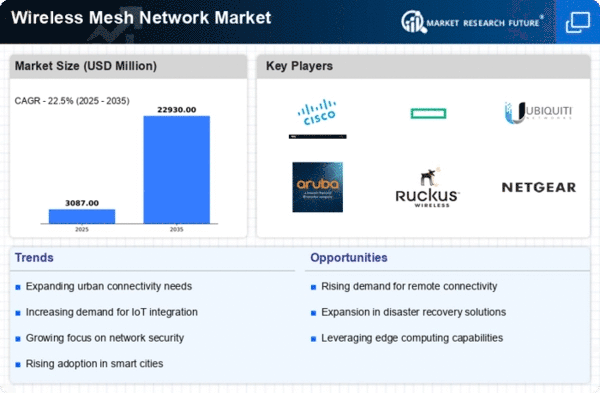Market Trends
Key Emerging Trends in the Wireless Mesh Network Market
The wireless mesh network market is witnessing significant trends driven by the increasing demand for scalable, resilient, and self-organizing wireless connectivity solutions that can address the challenges of expanding wireless coverage, enhancing network reliability, and supporting diverse IoT (Internet of Things) applications across various environments. One notable trend in the wireless mesh network market is the rising adoption of mesh Wi-Fi systems for seamless, whole-home or whole-office coverage, enabling users to extend wireless connectivity, eliminate dead zones, and provide consistent network performance across expansive indoor and outdoor areas. Consumers and businesses are turning to mesh Wi-Fi systems, which leverage interconnected nodes to create a unified, self-optimizing network, to deliver reliable, high-performance wireless coverage that adapts to the dynamic connectivity requirements of modern lifestyles and work environments. This trend is driven by the need for robust, scalable wireless connectivity solutions that can address the complexities of diverse indoor and outdoor networking environments.
Moreover, the wireless mesh network market is experiencing a surge in demand for outdoor and industrial mesh networking solutions that cater to smart city deployments, industrial IoT applications, public safety networks, and outdoor connectivity requirements. With the proliferation of outdoor IoT devices, smart infrastructure, and industrial automation systems, there is a growing need for rugged, weatherproof mesh networking solutions that can deliver reliable, long-range wireless connectivity, support outdoor networking requirements, and withstand harsh environmental conditions. This trend underscores the industry's recognition of the critical role of outdoor and industrial mesh networks in enabling secure, resilient, and high-capacity wireless connectivity for outdoor IoT deployments, smart city initiatives, and industrial automation applications.
Additionally, there is a notable trend towards the integration of AI-driven network optimization, self-healing capabilities, and intelligent traffic management within wireless mesh network solutions to enhance network performance, mitigate interference, and dynamically adapt to changing environmental conditions. Wireless mesh network providers are leveraging AI-powered network optimization tools, self-healing algorithms, and intelligent traffic steering mechanisms to proactively optimize network resources, mitigate network congestion, and dynamically reconfigure mesh nodes to ensure optimal network performance and reliability. This trend reflects the industry's commitment to harnessing AI and intelligent network management to enhance the adaptability, scalability, and self-optimizing capabilities of wireless mesh networks, addressing the demands for high-performance, resilient wireless connectivity across diverse environments.
Furthermore, the wireless mesh network market is experiencing a heightened emphasis on secure, encrypted mesh networking protocols, robust authentication mechanisms, and secure device onboarding to protect wireless mesh networks against cyber threats, unauthorized access, and data breaches. With the increasing deployment of IoT devices and the convergence of wireless connectivity with critical applications, organizations are prioritizing secure mesh networking solutions that offer robust encryption, secure device authentication, and secure onboarding processes to safeguard data integrity, privacy, and network security within mesh network environments. This trend underscores the industry's commitment to providing secure, resilient, and privacy-aware wireless mesh networking capabilities that mitigate security risks, protect sensitive data, and ensure the confidentiality and integrity of mesh network communications.


















Leave a Comment